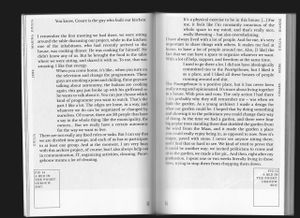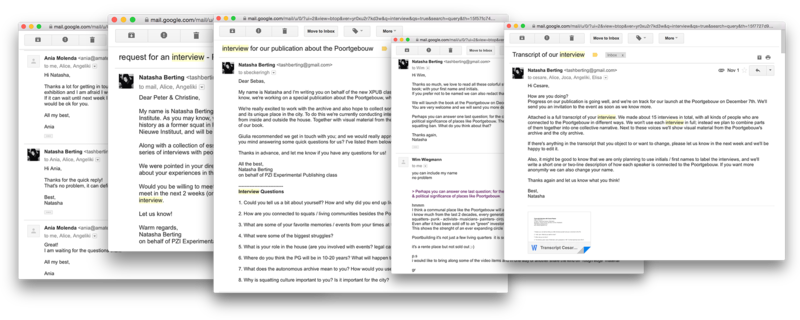User:Tash/Special Issue 04: Difference between revisions
No edit summary |
No edit summary |
||
| Line 23: | Line 23: | ||
** Why / in what ways is the Poortgebouw valuable to its inhabitants / its surroundings / society? | ** Why / in what ways is the Poortgebouw valuable to its inhabitants / its surroundings / society? | ||
** Why is it important to archive the Poortgebouw's history? | ** Why is it important to archive the Poortgebouw's history? | ||
*Prepared interview methodology, questions and schedule. | *Prepared interview [https://pad.pzimediadesign.nl/p/interviews_PG_method methodology], [https://pad.pzimediadesign.nl/p/questions_PG_autonomous_archive questions] and [https://pad.pzimediadesign.nl/p/interviews_PG_autonomous_archive schedule]. | ||
*Conducted interviews, wrote up transcripts, proofread transcripts, communicated with involved parties for final edits. | *Conducted interviews, wrote up transcripts, proofread transcripts, communicated with involved parties for final edits. | ||
*Helped establish the collective narrative idea, combining not just different voices but sources of material, creating a 'parallel archive' of oral histories to flow alongside visual and historical documents from the AA | *Helped establish the collective narrative idea, combining not just different voices but sources of material, creating a 'parallel archive' of oral histories to flow alongside visual and historical documents from the AA | ||
*Once the title was decided, editing text and photography into chapters: Bed, Chair and Table. Method: loosely chronologically, narrative first | *Once the title was decided, editing text and photography into chapters: Bed (personal), Chair (communal) and Table (social & political). <br>Method: loosely chronologically, narrative first | ||
*Learnt how to edit the narrative of the images as well as the text | |||
*Writing the [https://docs.google.com/document/d/1fBw1HTB-IN-nTGavH4Z10iEbHVbO8QHa7P1H78wNy80/edit?usp=sharing introduction], [https://docs.google.com/document/d/1mowD5CzfG4jbV2kOk1yM3UGmJQGAqWK2f7ez-K8anIo/edit?usp=sharing blurb] and promotional text | *Writing the [https://docs.google.com/document/d/1fBw1HTB-IN-nTGavH4Z10iEbHVbO8QHa7P1H78wNy80/edit?usp=sharing introduction], [https://docs.google.com/document/d/1mowD5CzfG4jbV2kOk1yM3UGmJQGAqWK2f7ez-K8anIo/edit?usp=sharing blurb] and promotional text | ||
*Proofreading (on paper and online). Next time, more attention on this; use different media to proofread. | *Proofreading (on paper and online). Next time, more attention on this; use different media to proofread. | ||
==On archiving== | ==On archiving== | ||
* Learnt a lot about archiving - it’s uses, it’s theoretical, social and political contexts. | |||
==On publishing & free culture== | ==On publishing & free culture== | ||
* Publication as a tool, and as a statement, especially in a subculture like squatting. Licence strategies, democracy and information. History of computation, free culture. | |||
==Going forward== | ==Going forward== | ||
Overall findings, what I want to do next. | Overall findings, what I want to do next. | ||
Revision as of 20:39, 3 December 2017
Our first Special Issue is a publication about the Poortgebouw, inspired by the collective's own Autonomous Archive.
Extract from our Special Issue 04 website: A Bed, A Chair and a Table is a publication about a former squat and vibrant living community in the South of Rotterdam. In this book, oral histories from inside and outside the Poortgebouw are interlaced with material from various institutional and personal archives. By bringing together tales of resilience, political struggle, frustration and friendship with historical documents, we bring forward new perspectives about the Poortgebouw's history and its importance in the contemporary city.
On organization
We organized ourselves into two main groups; the first focussed on content and the second on design & production. Considering this was our first publication; and that it concerned print (the medium I'm most experienced in), I decided to join the content team. This is the field that I know I want to specialise in, and I saw this project as a great opportunity to learn more about the publishing process, from start to finish. I'd never worked in such a large and diverse team before and I found the process to be incredibly rewarding.
Some things I did / learned:
- Managing tasks & schedules on our wiki: https://pzwiki.wdka.nl/mediadesign/Autonomous_Archive/hand-curated
- Importance of setting up clear expectations between our groups. Channels of communication and conflict resolution methods should be agreed on in advance.
- Aggregative democracy is not always the most effective model! We learnt to try different methods of decision-making, like making priority lists, asking a third party for opinions.
- The traditional print publishing workflow (including budgeting, licensing & distribution)
- Communicating with interviewees, parties from the PG
On the editorial process
- Research on the Poortgebouw and getting to know it's inhabitants: through interviews, through the wiki, through online material and city archives
- Concept development: coming up with a clear WHY for our publication
- Why / in what ways is the Poortgebouw valuable to its inhabitants / its surroundings / society?
- Why is it important to archive the Poortgebouw's history?
- Prepared interview methodology, questions and schedule.
- Conducted interviews, wrote up transcripts, proofread transcripts, communicated with involved parties for final edits.
- Helped establish the collective narrative idea, combining not just different voices but sources of material, creating a 'parallel archive' of oral histories to flow alongside visual and historical documents from the AA
- Once the title was decided, editing text and photography into chapters: Bed (personal), Chair (communal) and Table (social & political).
Method: loosely chronologically, narrative first - Learnt how to edit the narrative of the images as well as the text
- Writing the introduction, blurb and promotional text
- Proofreading (on paper and online). Next time, more attention on this; use different media to proofread.
On archiving
- Learnt a lot about archiving - it’s uses, it’s theoretical, social and political contexts.
On publishing & free culture
- Publication as a tool, and as a statement, especially in a subculture like squatting. Licence strategies, democracy and information. History of computation, free culture.
Going forward
Overall findings, what I want to do next.


